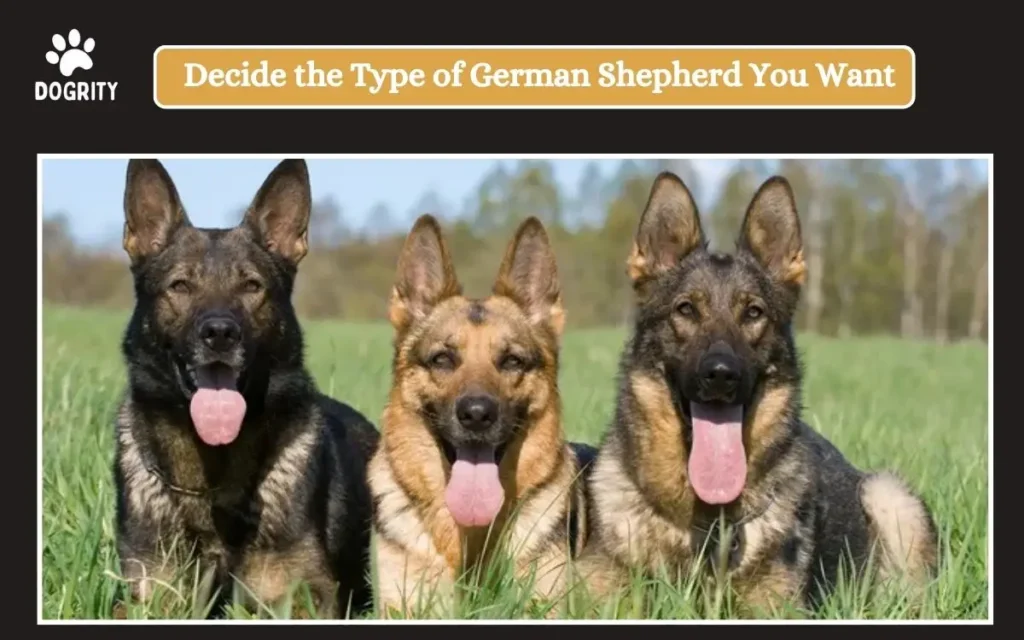A Comprehensive Guide to Buying a German Shepherd Puppy
German Shepherds are one of the smartest, most loyal, and most adaptable dog breeds. Finding the ideal puppy needs serious thought and inquiries, no matter what you want for a devoted friend, a working dog, or a show-capable pet. When purchasing a German Shepherd puppy, this guide will help you make the best decision possible.
- A Comprehensive Guide to Buying a German Shepherd Puppy
- Decide the Type of German Shepherd You Want
- Choose Between a Male or Female German Shepherd
- Select Your Preferred Coat Length and Color
- Find Reliable Sources for Healthy Puppies
- Identify Good Breeders and Avoid the Bad Ones
- Tips for Choosing the Right Puppy
- Understand the Costs of Owning a German Shepherd
- Prepare for Your New Puppy
- Final Thoughts
- Faq’s
Decide the Type of German Shepherd You Want

German Shepherds have been developed for specific purposes, therefore it’s important to know what kind you require. Finding the ideal dog is made easier when you know why you are looking.
Companion or Pet Quality
Pet-quality German Shepherds are ideal for families or individuals looking for a loving companion. These puppies might not meet the breed’s show or working standards but are bred for excellent temperaments.
Show Quality
If you’re interested in participating in dog shows or competitions, look for puppies bred to conform to the breed standards set by kennel clubs. These dogs have excellent structure, movement, and temperament for the show ring.
Working Quality
Working-line German Shepherds are bred for tasks like herding, security, police work, or search-and-rescue. These dogs are highly driven, focused, and require an active owner who can meet their physical and mental needs.
Choose Between a Male or Female German Shepherd

Your German Shepherd puppy’s size, temperament, and behavior can all be dependent on their gender. When choosing, take into account the following differences:
Traits of Male German Shepherds:
- Typically larger and more muscular than females.
- Bold, confident, and protective.
- Can be more independent and stubborn, requiring firm training.
Traits of Female German Shepherds:
- Slightly smaller and more agile.
- They are more sensitive and sympathetic, which makes them perfect for homes with children.
- They tend to be easier to train because they have a need to please.
In the end, the choice comes down to your own preferences and the purpose you hope your dog will fulfill.
Select Your Preferred Coat Length and Color

German Shepherds’ various coat colors and lengths make them appealing to many. Your specific grooming habits and sense of style could affect your choice.
Coat Length Options:
- Short Coat: Easy to maintain, ideal for hot climates, and sheds less compared to longer coats.
- Medium Coat: Regular grooming is necessary to strike a balance between usefulness and beauty.
- Long Coat: Gorgeous and luxurious, but needs regular brushing to prevent tying and shedding.
Common Coat Colors:
- Black and Tan: The classic look most people associate with the breed.
- Sable: light and dark hairs mixed together create a unique and stunning color pattern.
- Black: Stunning and advanced, but less common.
- Black and Red: Alive and frequently seen on show lines.
Your dog’s personality won’t be changed by coat length or color, but it will influence its looks and grooming needs.
Find Reliable Sources for Healthy Puppies

Spending a few days researching some trusted breeders or groups will bring about a healthy German Shepherd puppy. Do not rush to make purchases.
Online Ads and Listings
There are many ads of German Shepherd puppies online, but not all are from trusted sources. Avoid those breeders who cannot provide the proper health record or pressure you to make quick purchases.
Professional Recommendations
Ask your veterinarian, dog trainers, or experienced German Shepherd owners for breeder referrals. Trusted professionals often have connections to ethical breeders.
Shelters and Rescue Groups
Consider adopting! Many German Shepherds, including puppies, end up in shelters. This is a rewarding option if you’re open to giving a dog in need a home.
Dog Clubs
Breed-specific clubs, such as the German Shepherd Dog Club of America, can provide directories of reputable breeders who follow strict breeding standards.
Identify Good Breeders and Avoid the Bad Ones

Your puppy’s temperament and overall health can depend totally on the breeder you choose. Learn how to distinguish between good and bad breeders.
Signs of a Good Breeder:
- He provides health certificates and genetic testing done for hip and elbow dysplasia.
- They allow you to go visit the facility, so you can get to know the puppy’s parents.
- They put health, temperament, and well-being before profit.
- They have a written health guarantee for the puppy and will support you after bringing the puppy home.
Signs of a Bad Breeder:
- Breeds multiple types of dogs or litters without an emphasis on quality.
- Does not make health records available or respond to questions.
- Keeps puppies in unsanitary or overcrowded conditions.
Tips for Choosing the Right Puppy

When visiting the puppies, inspect for health and temperament that matches your lifestyle:
Health Indicators:
- Clear eyes and clean ears.
- Shiny coat and clean skin without bald spots.
- Active and playful behavior.
Temperament Testing
Observe how the puppy interacts with people and other dogs. Confident, curious, and social puppies are usually a good fit for most families. Avoid overly aggressive or shy puppies unless you’re experienced in handling behavioral challenges.
Understand the Costs of Owning a German Shepherd

German Shepherds are a long-term investment, and the initial purchase price is only part of the total cost.
Initial Puppy Price
Depending on the breeder and lineage, purebred GSD puppies cost between $500 and $3,000. Show or working-quality puppies can be on the higher end of this range.
Ongoing Expenses:
- Food: High-quality dog food is essential to support their growth and activity.
- Veterinary Care: Regular checkups, vaccinations, and potential health issues like hip dysplasia can add up.
- Training: Professional obedience training is highly recommended for this intelligent and active breed.
- Grooming: Depending on coat type, you may need grooming tools or professional services.
Prepare for Your New Puppy

Before bringing your puppy home, prepare your home and family for their arrival:
Puppy-Proof Your Home
Remove potential hazards like electrical cords, small objects, and toxic plants. Create a safe space for your puppy to explore.
Stock Up on Essentials
Get a comfortable bed, high-quality puppy food, food and water bowls, a leash, a collar, toys, and grooming supplies.
Plan for Socialization and Training
Start training and socializing your puppy as soon as possible. Introduce them to new people, environments, and experiences to help them grow into a well-rounded adult dog.
Final Thoughts
Bringing home a German Shepherd puppy is a rewarding experience, but it comes with responsibilities. By taking the time to research, plan, and choose carefully, you’ll find a loyal and loving companion that fits perfectly into your life. Remember, this is a lifelong commitment, so be prepared to provide the care, attention, and love your German Shepherd deserves.
Good luck on your journey to finding your perfect German Shepherd puppy!







